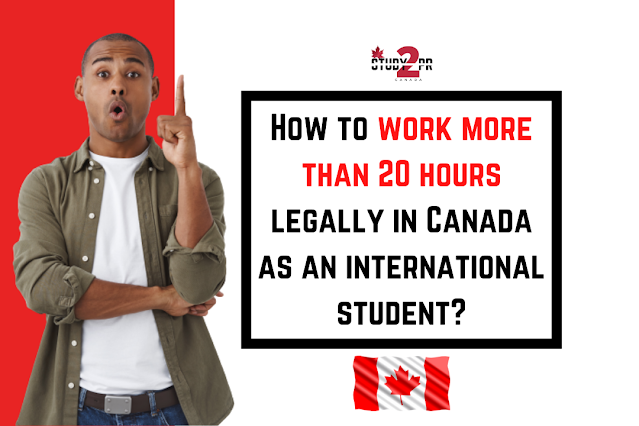How to work more than 20 hours legally in Canada as an international student?
Working 20 hours in Canada for an international student is legally
permitted, but working more than 20 hours can go beyond the boundaries of
legalization. If you are looking for a legal way to work more than 20, a few
practices can make it possible legally. So, keep reading the article until the
end, and you will get the answer.
Whether you are planning to study in Canada or have already
enrolled in any university, you know better than getting a work permit is not
much difficult. In case you don't get a work permit, you can even have a job
without it.
Maybe, you don't know about it, so I have covered a bit of it
here. And in this way, you can better understand the ways that I'm going to
discuss later.
So let's start with the eligibility criteria for working 20 hours:
·
When you are registered as a full-time student in a designated
learning institute, almost all secondary schools are designated learning
institutes for international students.
·
Another essential eligibility is when you are a student of a
vocational training program. Its duration is more than six months since some
institutes offer diplomas or short courses that can be less than six months
duration.
·
You must have started studying in any Canadian institutes. Some
students think they can secure a job before the beginning of the study and even
before arriving, which is mostly impossible.
·
If you are a part-time student, it's easier to work.
Meeting the points mentioned above makes you eligible to work 20
hours per week without any hurdles. Now, here is the big question: how can you
work more than limit hours remaining within the boundaries of law? Of course,
there is a way if you only follow the below instructions.
1) On-Campus jobs
One of the legit ways is getting an on-campus job. You might don't
know this, but it is legally possible. On-campus, a job means working in an
institute where you are enrolled as a student. Colleges or Universities are way
obtainable for the many jobs. Since the education institute functions as a huge
organization, you will find various vacancies, and it's a gateway to work more
than 20 hours.
Maybe you think you will have to give all of the extra hours in
the campus job, but it's not like this. These jobs are usually part-time, and
you might not even complete your 20 hours. In actuality, this thing works as
your on-campus job's working hours won't be counted in the 20 hours quota. For
instance, if you have a job at campus and whatever time you utilize, it doesn't
impact the work limits. It means you still have 20 hours in your bucket that
you can use in an off-campus job.
It's one of the legal ways to earn more and work more, so you
don't need to hesitate to avail yourself of a campus job if you are looking to
work more as an international student.
Usually, if you have an on-campus job then you can maximum work for 24 hours per week and other 20 hours for your non-campus job. So that means you are working of total 44 hours per week in this scenario which is equal to a full-time job.
Yes, your struggle will be increased but at the end of the day, you will have a nice sleep because its worth will count in your bank balance. The satisfaction will be more satisfying than regression hard work.
How difficult is getting jobs immediately after graduation for international students in Canada?
It is the question that must be revolving in your mind right now.
You can approach this job in many ways. First of all, you should not think that
campuses don't have work to offer students; there can be many paid positions
where they need students.
From lab assistance to the gym trainer, you will find officially
paid jobs. Universities have a specific system for international students.
Thus, you don't even need to struggle to win a job. The thing that you need is
your confidence and potential to get an opportunity.
Now, the first method is going with the university's official
announcement. Doubtlessly, they announce official job vacancies for the students.
So, you can simply visit your institute's website and follow the instructions
respectively to avail opportunity. These jobs usually include lab assistance,
librarian, gym trainer, sports expert, technician, and more like these.
Another way to get on campus-job is by approaching student unions.
In Canadian educational institutes, you will find a separate student union wing
to help aspirants. So, you can contact them. Indeed, you will get something.
2) Play with hours
Case 1
Another way to work more than 20 hours in a week is playing with 20 hours which you got for your part-time job from Canadian authorities.
This method is not that popular now but many students use to do this practice in their part-time jobs to get full benefits of their hours.
See, in Canada, if you are working as a part-time employee then sometimes you don't even get the full 20 hours to work. This feels everyone very irritating. From your job schedule, you might get only 14 hours, 13 hours, or 18.50 hours. So for that reason, the rest of the hours of your part-time job get wasted.
Solution
Eventually, you are getting paid for every 2 weeks which means for every other Friday you will get paid your salary. Here what you can do is you can ask your employee to get you to complete 40 hours in 2 weeks.
For instance, if you get 16 working hours in your first week then ask your employee to give you 24 hours in your other week which will make your cheque a total of 40 hours without wasting your single minute.
Which are the high-paying part-time jobs in Canada for international students?
Which intake is best for you to study in Canada? - Everything you need to know
Case 2
There are some of the companies are like, they only give you full-time shift which would be of 8 paid hours. They don't care about your 20 hours limitations. They won't give you additional 4 hours shift to finish your 20 hours. In this case, you will work only 16 hours that 2 shifts. Every week you suppose to waste your 4 hours biweekly you are wasting 8 hours and in the month you are wasting your 16 hours.
So total loss would be like if we count you are working on basic pay of CAD $14.25
The 14.25 * 16 = $228
And this much amount of money is good enough to spend your whole monthly grocery on. Even tiffin services here in Canada cost you about $200 for a month.
This I counted for basic pay, but sometimes it's not that much only loss. Some student gets a job with a high-paying salary of about $18/hours or $20/hours which result in a huge loss of money.
Solution
So here is the same thing you can do to save your hours. You work 16 hours for the first week and 24 hours for another week. The total will be of 40 hours. No wasting your time no loss of money.
They have only 8 hours shifts which means they can't give you 4 hours shifts but they can give you 8 hours extra shifts to cover your wasted hours. And they do. They won't deny unless there is no requirement of any employee.
Now hope you have got my points.
Otherwise, except for this method, you cant work more than 20 hours a week. If you do it can really put you in trouble to get your post-graduation work permit. So be aware of the rules and regulations and don't violate the rules.
How much can you earn with the on-campus job?
it's another crucial question that you need to know. Certainly,
working more than 20 hours means earning more for you. If you have an extra job
with the on-campus job, you can earn almost 2000$ per month, which is more than
enough for you. Estimated, on-campus jobs pay 800 to 1000$ per month. You need
to achieve it, and it's not difficult because most students are working at
their institutes.
Let's take one example,
In Canada it basic pay is $14.25 right now. It may gonna elevated to $15 from Jan 2022.
The minimum wage for the on-campus job is $15 right now.
So, for on-campus job :
15 * 24 hours * 4 Weeks = $1440
For off-campus job: $14.25 * 20 hours *4 weeks = $1140
Now, expenses = 400 house rent + 200 grocery + 100 miscellaneous (Phone bill + small purchases).
Total = $700
Still, you are saving 2280 - 700 = $1580
And you will also get your GIC of nearly $650 for the first year which is an addition to your saved money.
So, opportunities are more, you need to look for them and grab them. It's not gonna be happened without taking action. Study hard work hard to get a job on-campus and as well as off-campus.
Conclusion
Overall, there are possible and legal ways to work more than 20
hours as an international student in Canada if you don't volatilize legal
conditions and work smoothly. However, you will find many ways to find easier,
with high salaries, but it can be a huge threat for your career. So, it's
suggested to work more and earn more within the legal boundaries. Apart from
the on-campus job, students find other methods to fulfill their expenditure.
Still, again before jumping for anyway, you should gather authentic
information, or it's better to contact any legal authority, which will guide
you in the right direction.
What are the difficulties international students face in Canada?
What to choose University or College in Canada?





0 Comments